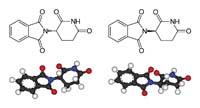Few women in experiments
2009/06/27 Galarraga Aiestaran, Ana - Elhuyar Zientzia
The data are clear and indisputable. However, opinions have been very varied. Some believe that it is normal for fewer women than men to participate in this type of experiments, normal and convenient, to protect them from possible damage. And they consider that women can have more and more serious side effects. In addition, it should be noted that during the experiment some women may become pregnant, in these cases the treatment may affect the fetus.

The oncologist Reshma Jagsi has reported that fewer women than necessary participate in the clinical sessions. (Photo: University of Michigan)
These types of arguments are not new. Furthermore, for these reasons, women did not participate in the clinical trials of drugs before. For its protection. Later, however, they were harmed. The best known example is the case of thalidomine. Thalidomide was marketed in 1958 to treat insomnia and anxiety. Pregnant women also did so to alleviate the discomfort caused by pregnancy. They did not know that this substance caused malformations in the fetus and thousands of children were born with some malformation.
Since then women have also been considered in experiments. So they have shown, for example, that aspirin does not have the same effect on men and women. In a study in 1982, the risk of developing an infarction was found to be reduced by 44% daily with a dose of aspirin. This research lasted 5 years and was attended by 20,000 doctors from all over the world. All the volunteers of the clinical sessions led by them were men.
Twenty years later, in 2005, they investigated again with 40,000 healthy women. And they saw that aspirin does not affect women equally, specifically, before menopause, aspirin has no protective effect, but it does after menopause.
Therefore, theoretically, the number of women participating in the experiments should be proportional to the incidence of the disease under study on the population, and thus are advised by health institutions. However, the recommendations have not become standard, and while in practice they have been decades since thalidomide was produced, the number of women participating in clinical trials has decreased.
A third less than enough
Reshma Jagsi is an oncologist at the University of Michigan and, in researching breast cancer treatments, almost all of the people involved in their experiments are women. It occurred to him to study what happened in the studies of other cancers. Thus, seven types of cancer were fixed, of which six were underutilized, one third less than enough. For example, 45% of lung cancer cases occur in women, but in clinical sessions only 31% of participants.
And the separation is not only given in the number of participants. For example, some drugs have better results in women than in men, but are not taken into account. In Jagsi's words, what happens in women is considered a "deviation from the standard" and is not investigated.
On the other hand, sometimes fewer women are offered than men to be voluntary, so Jagsi proposes to study why. In fact, she suspects that women with children may have practical difficulties (with whom to leave while children, how to organize...). It seems appropriate for Jagsi to grant aid to overcome these drawbacks.
Pending to see if the Jagsi study will affect the participation of the clinical tests. For the moment the debate has risen.
Published in Gara

Gai honi buruzko eduki gehiago
Elhuyarrek garatutako teknologia





